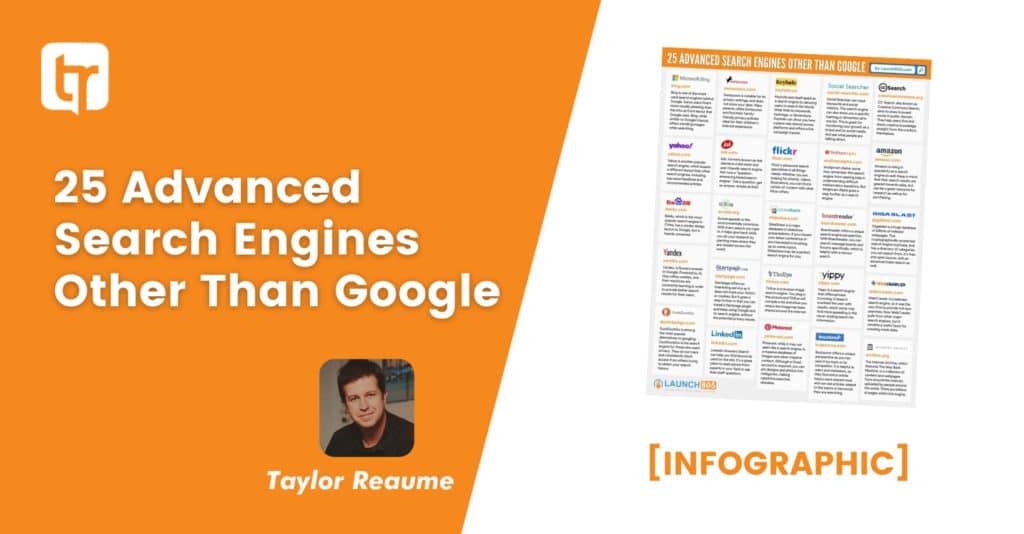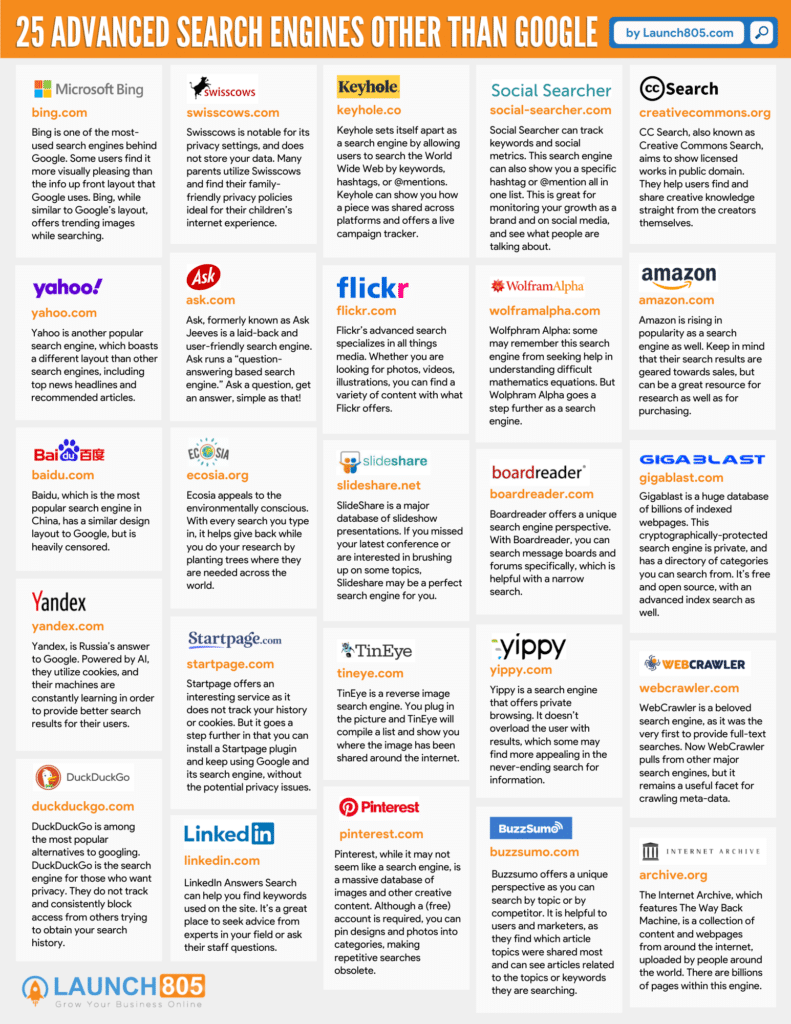25 Advanced Search Engines (Other Than Google)

It may come as a shock to learn that Google is not the end-all be-all search engine. There are many search engines out there, much more than the 25 included in this list.
Learning how Google stores and utilizes the information you search for may lead to seeking out a different, more private search engine.
Which search engine is right for you? It depends on what you are searching for and what you are interested in finding.
Are privacy and tracking options important to you? Are you looking for academic material or strictly for video clips? The search engines you use can help better define your search, and get you the answers you need more quickly.
Thankfully, you have options! Keep reading to find which search engine best fits your needs.

- Bing is one of the most-used search engines behind Google. Some users find it more visually pleasing than the info up front layout that Google uses. Bing, while similar to Google’s layout, offers trending images while searching.
- Yahoo is another popular search engine, which boasts a different layout than other search engines, including top news headlines and recommended articles.
- Baidu, which is the most popular search engine in China, has a similar design layout to Google, but is heavily censored.
- Yandex is Russia’s answer to Google. Powered by AI, they utilize cookies, and their machines are constantly learning in order to provide better search results for their users.
- DuckDuckGo is among the most popular alternatives to googling. DuckDuckGo is the search engine for those who want privacy. They do not track and consistently block access from others trying to obtain your search history.
- Swisscows is notable for its privacy settings, and does not store your data. Many parents utilize Swisscows and find their family-friendly privacy policies ideal for their children’s internet experience.
- Ask.com formerly known as Ask Jeeves is a laid-back and user-friendly search engine. Ask runs a “question-answering based search engine.” Ask a question, get an answer, simple as that!
- Ecosia appeals to the environmentally conscious. With every search you type in, Ecosia helps give back while you do your research by planting trees where they are needed across the world. They are privacy-friendly and utilize Bing and their own algorithms to bring you your results.
- Startpage offers an interesting service as it does not track your history or cookies. But it goes a step further in that you can install a Startpage plugin and keep using Google and its search engine, without the potential privacy issues.
- Pinterest, while it may not seem like a search engine, is a massive database of images and other creative content. Although a (free) account is required, you can pin designs and photos into categories, making repetitive searches obsolete.
- Keyhole sets itself apart as a search engine by allowing users to search the World Wide Web by keywords, hashtags, or @mentions. Keyhole can show you how a piece was shared across platforms and offers a live campaign tracker. Keyhole utilizes social listening online and provides analytics to help improve your online marketing strategies.
- Flickr’s advanced search specializes in all things media. Whether you are looking for photos, videos, illustrations, you can find a variety of content with what Flickr offers.
- SlideShare is a major database of slideshow presentations. If you missed your latest conference or are interested in brushing up on some topics, Slideshare may be a perfect search engine for you.
- TinEye is a reverse image search engine. You plug in the picture and TinEye will compile a list and show you where the image has been shared around the internet.
- LinkedIn Answers Search can help you find keywords used on the site. It’s a great place to seek advice from experts in your field or ask their staff questions.
- Social Searcher can track keywords and social metrics. This search engine can also show you a specific hashtag or @mention all in one list. This is great for monitoring your growth as a brand and on social media, and see what people are talking about.
- Wolfphram Alpha: some may remember this search engine from seeking help in understanding difficult mathematic equations. But Wolphram Alpha goes a step further as a search engine. The website offers expert knowledge in a variety of fields, and is a hub of helpful videos and examples to explain any question you may have. It is privately owned and doesn’t track your searches.
- Boardreader offers a unique search engine perspective. With Boardreader, you can search message boards and forums specifically, which is helpful with a narrow search.
- Yippy is a search engine that offers private browsing. It doesn’t overload the user with results, which some may find more appealing in the never-ending search for information.
- Buzzsumo offers a unique perspective as you can search by topic or by competitor. This search engine is helpful to users and marketers, as they find which article topics were shared most and can see articles related to the topics or keywords they are searching.
- CC Search, also known as Creative Commons Search, aims to show licensed works in public domain. They help users find and share creative knowledge straight from the creators themselves. If you or your company want to avoid copyright claims, using CC Search may work for you.
- Amazon is rising in popularity as a search engine as well. Keep in mind that their search results are geared towards sales, but can be a great resource for research as well as for purchasing.
- Gigablast is a huge database of billions of indexed webpages. This cryptographically-protected search engine is private, and has a directory of categories you can search from. It’s free and open source, with an advanced index search as well.
- WebCrawler is a beloved search engine, as it was the very first to provide full-text searches. Now WebCrawler pulls from other major search engines, but it remains a useful facet for crawling meta-data.
- The Internet Archive which features The Way Back Machine, is a collection of content and webpages from around the internet, uploaded by people around the world. There are billions of pages within this engine.
Privacy concerns are not the only reason users may seek out other advanced search engines other than Google. Some users have a more specific search request or want to search a database without the possibility of copyright claims.
From Swisscows, known for its privacy settings, to TinEye, an advanced image search engine, there are many search engines that hold their own against Google, by offering niche or advanced features.
Really it comes down to which search engine best suits your needs.
Which search engine is your favorite and why? Let me know in the comments below!


